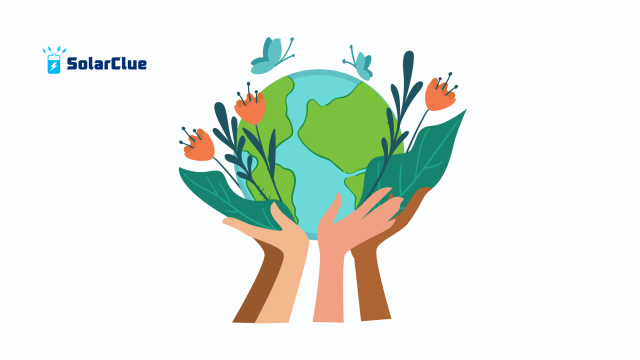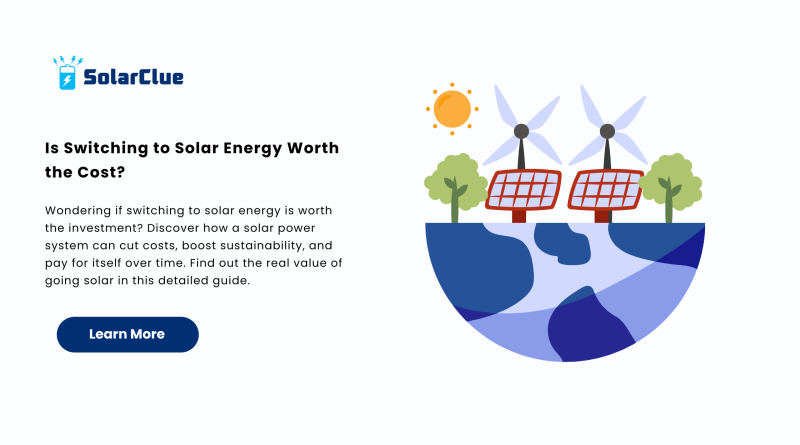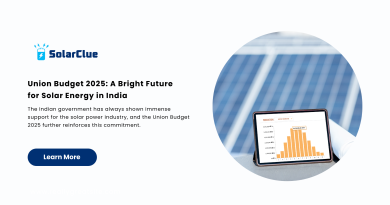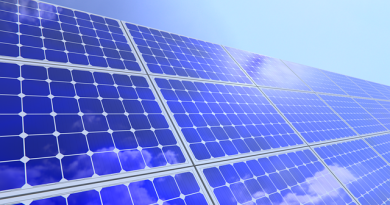Is Switching to Solar Energy Worth the Cost?
With rising electricity bills, environmental concerns, and growing energy demands, many homeowners and businesses are asking the big question: Is switching to solar energy worth the cost? The answer isn’t one-size-fits-all, but in most cases, the return on investment from a solar power system can be both financially and environmentally rewarding. Let’s break it down in simple, practical terms.
Table of Contents
- 1 Understanding Solar Energy
- 2 Initial Costs: What Are You Really Paying For?
- 3 How Much Can You Save?
- 4 Financial Benefits That Make Solar Worth It
- 5 Environmental Impact of Solar Energy
- 6 Common Misconceptions About Solar Power
- 7 Is Solar Power Right for You?
- 8 Real-Life Example
- 9 Final Verdict: Is It Worth It?
- 10 FAQs
Understanding Solar Energy
Solar energy is the power harnessed from the sun using photovoltaic cells, usually in the form of solar panels. These panels convert sunlight into electricity, which can power your home or business. Once installed, a solar power system produces clean energy, helping reduce reliance on fossil fuels and lowering carbon emissions.
Initial Costs: What Are You Really Paying For?
The upfront cost is often the biggest hurdle for people considering solar. A typical residential solar panel setup in India can range between ₹75,000 to ₹1,50,000 per kW depending on the brand, quality, and installation area. However, this cost includes: Solar panels (mono or polycrystalline), Inverter (to convert DC to AC), Mounting structures, Wiring & electricals, and Installation & service charges. Thanks to government subsidies and incentives, especially through schemes like PM Surya Ghar Yojana, these costs are coming down significantly. In many states, users can claim up to 40% subsidy on the benchmark cost.
How Much Can You Save?
Here’s where it gets interesting. If your average monthly electricity bill is ₹3,000, that’s ₹36,000 per year. A well-designed solar power system can offset up to 80–90% of that cost. Over 20 years (a typical solar panel lifespan), you could save ₹7–8 lakhs. And remember, once your system is installed, sunlight is free. The only costs you’ll incur are occasional maintenance, which is minimal for modern systems.

Financial Benefits That Make Solar Worth It
Net Metering
Most states in India offer net metering. This allows you to export excess electricity your system generates back to the grid. You earn credits for the extra power, reducing your electricity bill even further.
Return on Investment (ROI)
A standard solar power setup pays for itself within 4–6 years. After that, it’s all savings. The internal rate of return (IRR) on solar investments can be 15–20%, which is significantly higher than traditional fixed deposits or mutual funds.
Increased Property Value
Homes with solar panels often sell faster and at a premium. Buyers are increasingly aware of the benefits of energy-efficient homes, making your investment more attractive in the real estate market.
Environmental Impact of Solar Energy
Using solar energy helps reduce your carbon footprint. A typical 1kW solar power system prevents around 1.5 tonnes of CO₂ emissions per year. That’s like planting 25 trees annually! Choosing solar isn’t just a financial decision—it’s a step toward a greener, more sustainable future.
Common Misconceptions About Solar Power
“Solar panels don’t work on cloudy days.” This is not true. Solar panels still generate electricity even when it’s cloudy—though at reduced efficiency. Modern systems are designed to perform efficiently in varying weather conditions.
“Solar energy is too expensive.” Once you factor in subsidies, long-term savings, and financing options, solar becomes affordable for most households.
“Maintenance is a headache.” In reality, solar panels are low maintenance. Occasional cleaning and an annual check-up are generally sufficient.
Is Solar Power Right for You?
You should consider a solar power system if: You have access to an unshaded rooftop. You’re tired of high electricity bills. You want a long-term solution with high ROI. You care about the environment. Even if you don’t plan to stay in your current home long-term, the increased property value and reduced bills during your stay can still make it worthwhile.
Real-Life Example
Ramesh from Bangalore installed a 3kW solar panel system on his rooftop. His monthly bill dropped from ₹2,800 to ₹400. Within five years, he recovered his entire investment and now enjoys almost zero electricity costs while powering his AC, fridge, TV, and lighting. Plus, he’s contributing to a cleaner planet!
Final Verdict: Is It Worth It?
Yes, switching to solar energy is worth the cost—especially in a country like India with abundant sunlight, rising grid costs, and increasing awareness of sustainability. While the upfront cost may seem high, the long-term savings, environmental impact, and growing government support make it a smart, future-proof decision. If you’re still unsure, consult professionals to assess your rooftop and energy needs. A personalized solar consultation can give you clarity on sizing, savings, and cost.
FAQs
Q1: How long do solar panels last?
Most solar panels have a lifespan of 25–30 years, with many retaining 80% efficiency even after 25 years.
Q2: What happens during power cuts?
Grid-tied systems without batteries will shut off during outages for safety. For backup, consider hybrid or off-grid systems with battery storage.
Q3: Can I upgrade my solar system later?
Absolutely. You can add more solar panels or switch to hybrid inverters later based on your growing needs.
Q4: Is solar energy really free after installation?
Yes! Sunlight is free. Post-installation, your only cost is occasional maintenance, which is minimal.
Q5: Will I get a subsidy on my solar installation?
If you’re a residential user installing a grid-connected system under the government scheme, you can claim up to 40% subsidy on the benchmark cost.
Still thinking if solar is right for you? Start with a free consultation and explore the best solar solutions tailored to your home or business at 👉 solarclue.com and dive deeper with expert blogs at 👉 blog.solarclue.com. Let the sun power your savings today!




